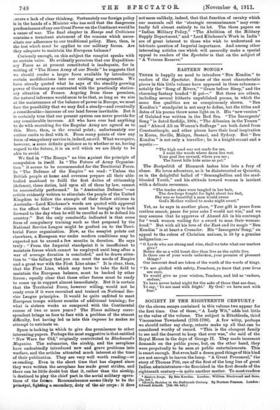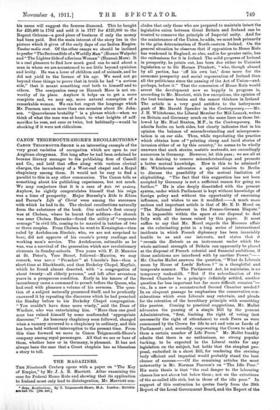SOCIETY IN THE EIGHTEENTH CENTURY4 OF the eleven essays contained
in this volume two appear for the first time. One of these, "A Lady Wit," adds but little to the value of the volume. The subject is Etheldreda, third Viscountess Townshend (1701-1796). A few witty, perhaps we should rather say sharp, retorts make up all that can be considered worthy of record. " This is the cheapest family to see and the dearest to keep that ever was," she said of the Royal House in the days of George II. They made incessant demands on the public purse, but, on the other hand, they were perpetually to be seen at public entertainments. This is smart enough. But even half a dozen good things of this kind are not enough to leaven the lump. " A Great Proconsul," the story of Thomas Pitt, one of the first of the long line of great Indian administrators—he flourished in the first decade of the ,eighteenth century—is quite another matter. To most readers
* Eastern Songs. By Ben Senclim. London : William Blackwood and Sons. [5s. net.] tEociety Sketches in the Eighteenth Century. By Norman Pearson. London: Edward Arnold. [12s. 6d. net.) his name will suggest the famous diamond. This he bought for E20,400 in 1702 and sold it in 1717 for £125,000 to the Regent Orleans—a good piece of business if only the money had been paid. But the main interest of the story lies in the picture which it gives of the early days of our Indian Empire. Pardee molls erat. Of the other essays we should be inclined to prefer " The Serious Side of aWoridly Man" (Horace Walpole) and " The Lighter Side of a Serious Woman" (Hannah More). It is a real pleasure to find bow much good can be said about a man in whom we are accustomed to see little beyond cynicism and levity. He was a lover of children and of animals, and he did not yield to the licence of his age. We need not go beyond these things to prove that in truth he had " a serious side," that it meant something real both to himself and to others. The companion essay on Hannah More is not un- worthy of its place. Anyhow it helps us to get a more complete and, we may say, more natural conception of a remarkable woman. We can but regret the language which Mr. Pearson uses on more than one occasion about Dr. John- son. " Quarrelsome brutality " is a phrase which—when we think of what the man was at heart, to what heights of self- sacrifice he rose, not once or twice, but habitually—would be shocking if it were not ridiculous.







































































 Previous page
Previous page